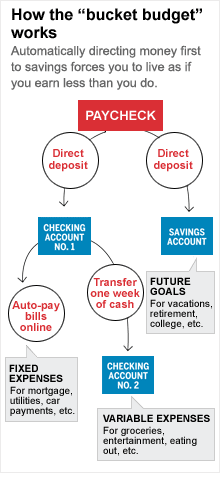Hate budgeting? Try these spending strategies
Did your last attempt at a spending plan fail to take hold? Understanding why can help you find a system that works.

(Money Magazine) -- Constant news of layoffs, pay cuts, and stock declines has all of us tightening our belts: A recent Money poll found that in light of the financial crisis, 89% of us are changing the way we manage our finances, and 88% plan to be more frugal.
In theory, the best tool to achieve both purposes would be - shudder - a family budget. Put that on the to-do list right after dieting and making an appointment with the dentist.
Oh, sure, we all have friends who are addicted to Quicken, and bully for them. But for a lot of us, using traditional budgeting tools is like "trying to fit a round peg in a square hole," says Bill Starnes, a financial planner in Hockessin, Del. And any pre-schooler knows how well that works.
So how can the less obsessive - er, organized - among us better manage our money? Below are some alternative methods that achieve the same goals as a traditional budget (that is, to live within your means and meet your savings target). To find the plan that will work for you, think back to why your last budget failed - or why you never started one in the first place.
If you hated the work involved, try ...
How it works: You'll need three bank accounts - two checking, one high-yield savings. First, figure out how much of every paycheck you want to put toward savings. Have that automatically sent to the savings account, which serves as a future-goals way station; you can redirect it later.
Send the rest of your paycheck to checking account No. 1. (Talk to your payroll department to set up multiple direct deposits.) From this you'll pay monthly fixed expenses, such as mortgage and utilities; set up automatic bill payment online.
Figure out your monthly surplus in this account after recurring bills, divide by four, and set up a weekly automatic transfer for that amount to checking account No. 2. This is for variable expenses like groceries, entertainment, and eating out. Two rules: You can't transfer more money over until the next week, and you can't use credit cards.
Why it'll work for you: "This gets you away from micromanaging," says financial planner Eric Kies, who helped develop this system, called First Step Cash Management. In fact, it basically manages itself; all you have to do is watch your balance on the second checking account. The system creates "artificial scarcity," forcing you to live on less and within hard boundaries.
If you quickly lost interest, try ...
How it works: This will require one intense weekend - but just one weekend. Pull out your bank and credit card statements for the past three months, and make a list of your recurring expenses and the amounts.
Now instead of budgeting per se, you're going to pick one or two large line items to cut to meet your budgetary goals. This might be painful, but consider the end result: The thousands you'll save by, say, getting rid of the second car - and the insurance, fuel, and maintenance bills that come with it - may make carpooling more palatable. Plus, making one big sacrifice means you don't have to think about budgeting again till next year.
Why it'll work for you: Unlike the tedious routine of a traditional budget, this slash-and-burn tactic offers no room for boredom, says financial planner Mary Claire Allvine. Short-attention-span folks can pour a lot of energy in upfront and start seeing results fast.
If you struggled with self-control, try ...
How it works: You'll need to choose a "referee," someone whom you trust to hold you accountable for sticking to your spending or saving goal and who will be willing to monitor your progress. Make a contract with this person via Stickk.com, a site that uses financial punishments to hold you to your word. State the goal, make a schedule of checkups, and choose a small fee you'll pay if you fail. You can have this money go to the ref, a charity, or even an "anti-charity" - say, the Democratic Party if you're a Republican.
Why it'll work for you: Just as the threat of the boss's ire can help you get a project done at work, the threat of punishment can help hold you to a savings goal, behavioral economists have found. "It's all about making success cheaper and failure more expensive," says Dean Karlan, an economics professor at Yale and founder of Stickk.com. "Even having to face someone with failure is a social cost." ![]()


